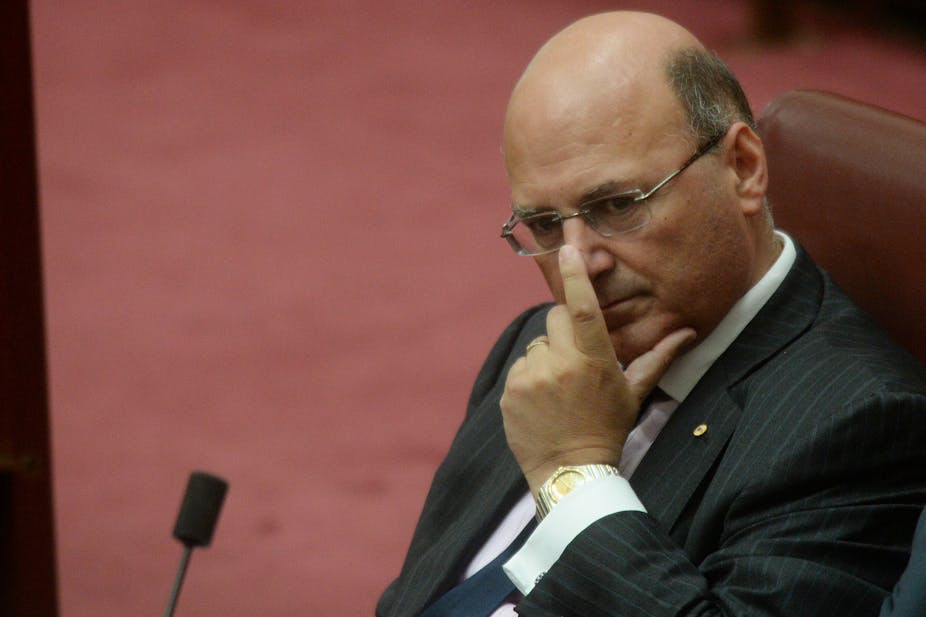Interviewed recently about the government’s plan to roll back key consumer protections in Labor’s financial advice legislation, Arthur Sinodinos said his advice to consumers was to “get more informed”.
“At the end of the day that is the best sanction on financial advisers,” said Sinodinos, who has been in charge of the revision.
The problematic nature of that proposition can be highlighted by this week’s revelations about Sinodinos’ role in Australian Water Holdings.
On his own account, despite being paid $200,000 annually as a director, he didn’t know of the company’s financial connection to the Obeid family or the donations it gave to the Liberal party. In the wake of what came out at ICAC, Sinodinos has now stepped aside as Assistant Treasurer while the inquiry is on.
If Sinodinos, with years of political and business experience, couldn’t be across such key facts about a company of which he became chairman, how can he and the government credibly argue that someone with no expertise can be their own best watchdog on those proffering financial advice?
Perhaps key information about AWH might have been kept from Sinodinos; certainly the Coalition’s amendments will make it easier for the financial advice industry to avoid telling clients pertinent facts.
The government’s changes to FoFA (Future of Financial Advice) legislation are in response to industry pressure – although some even there believe they go too far – and were promised before the election.
Driven by the collapse of firms such as Storm Financial, Labor introduced a raft of consumer protections. Advisers must act in their client’s best interest. They have to get clients to “opt in” every two years to continue to receive their service. Annual statements disclosing fees and details of services performed are required. “Conflicted remuneration” is banned – for example, commissions paid by product providers to financial advisers.
The Abbott government is set to water down the “best interest” requirement; scrap the “opt in” provision; limit the annual disclosure measure so it applies just to post July 1, 2013 clients; and apply the ban on “conflicted remuneration” only to the provision of personal advice - exempting general advice.
The return of commissions is seen as particularly advantaging the banks, and as identified with Sinodinos, who was a NAB executive in his time in the business world. It was one measure that was not part of the pre-election policy.
Questioned on the ABC’s Lateline about the concern that, for example, bank staff could be motivated by remunerations that were not obvious to the consumer, Sinodinos said: “the bank teller has to disclose to the person that if you want something that is focused on your circumstances, please get personal advice and the product disclosure.”
But how many bank clients, especially those not financially savvy, would miss this orange light? A skilled salesman, anxious to get his reward, could make it sound just a conversation line.
The Financial Planning Association of Australia is strongly against the payment of commissions, and has been vocal about that part of the government’s plan.
The government has now, late in the piece, tightened its proposals so a commission would only be able to be paid to direct employees of the organisation – still okay for the banks - and only if they have not provided personal advice in the past year.
Matthew Rowe, chairman of the FPA, welcomes this but reiterates that the FPA remains opposed to commissions. “We believe commissions on investment and superannuation products are a conflict that cannot be managed and must be avoided,” he says.
The government is very anxious to get its liberalisation operating quickly. Legislation was introduced this week - but that process is too slow for it.
The changes (now falling under the responsibility of Finance Minister Mathias Cormann, who is doing Sinodinos’s work) are due to be brought in by regulations late next week (in response to a question on Thursday a government source said the timetable for the regulations was still being finalised). These would take effect at once. Labor promises to try to disallow them; but that could not be before Parliament resumes in mid- May for the budget session.
It’s a cat and mouse game bringing uncertainty for the industry, which could find its operating rules altering several times in a short while – and potential confusion for consumers.
The government’s changes are dressed up as part of its “cutting red tape” push, that it began to roll out this week and will continue next week - a broad initiative which, unfortunately for the Coalition, was overshadowed by the Sinodinos affair.
The anti red tape mission is part policy sense and good housekeeping, part gimmick (to be seen to be doing something that’s liked by business and the base) and part ideology.
Yes, too much red (and green) tape is bad and should be periodically cleaned out. Some of it is important - because it adds to business burdens, has outlived its usefulness or no longer serves its purpose. Some of the really old stuff falls into the category of historical oddity – it doesn’t really matter that it’s there except to those with extremely tidy minds.
But to define regulation simply in terms of “red tape” is to substitute propaganda for proper thinking. We have, and need, many regulations for the public good – and among them are robust consumer protections in complex areas.
As in medicine and law, so with financial advice. People should be able to have confidence that there are strong safety checks, rather than having to second guess what they’re told and wonder about the connections and motives of those telling them.
Listen to the latest Politics with Michelle Grattan podcast, with guest Cathy McGowan here.

